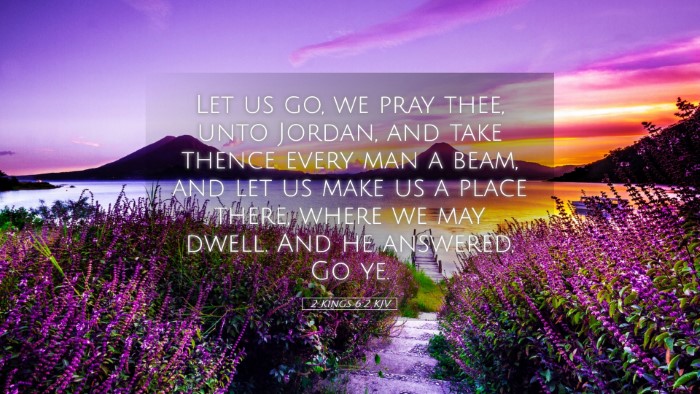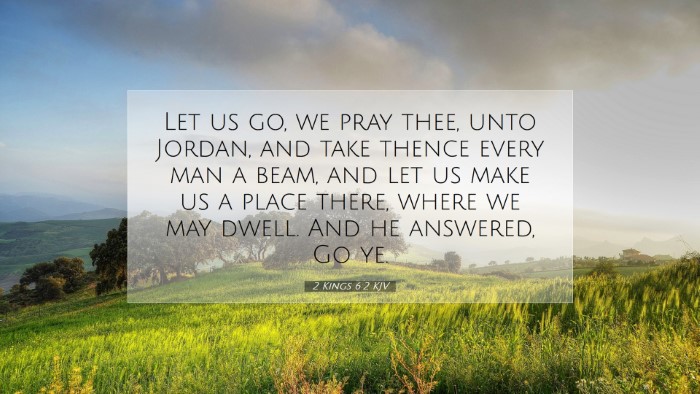Commentary on 2 Kings 6:2
2 Kings 6:2 states, "Let us go, we pray thee, unto Jordan, and take thence every man a beam, and let us make us a place there, where we may dwell." This verse marks a significant moment in the ministry of Elisha, emphasizing themes of communal effort, spiritual growth, and divine provision.
Contextual Background
The context of this verse occurs during a time of transition for the Israelites, as they were under threat from both external enemies and internal strife. Elisha has taken the mantle of the prophetic ministry from Elijah and is leading a group of prophets, commonly referred to as the "sons of the prophets." The request to go to the Jordan reflects a desire for growth, both physically and spiritually.
Commentary Insights
Various public domain commentaries provide a rich exploration of this verse:
Matthew Henry's Commentary
Henry emphasizes the import of community in spiritual endeavors. He notes that the "sons of the prophets" sought to expand their meeting place to accommodate their growing number, which symbolizes a collective desire for fellowship and the pursuit of a faithful life. According to Henry, their request to go to Jordan signifies a willingness to work together and invest in their spiritual development. The Jordan River is associated with divine encounters and miraculous acts, underscoring the idea that their efforts would be blessed by God.
Albert Barnes' Commentary
Barnes identifies the gathering of these prophets in the wilderness as a response to the pressing need for accessible spiritual teaching. He comments on the architectural aspect, noting the importance of a dedicated space for worship and instruction. The act of chopping beams for construction is seen as a practical application of faith, where physical labor is intertwined with spiritual aspiration. Barnes points out that the desire for a suitable dwelling reflects a yearning for stability and a commitment to their prophetic mission.
Adam Clarke's Commentary
Clarke provides insight into the practicalities surrounding the construction project and highlights the importance of their geographical choice. He notes that the abundant timber along the Jordan would facilitate their efforts, illustrating how God's provision plays into their plan. Clarke also references the symbolism of the Jordan River, citing its significance in the spiritual history of Israel, thus relating their venture to a broader narrative of divine guidance and intervention.
Theological Implications
The themes in 2 Kings 6:2 can resonate deeply with pastors, students, theologians, and scholars:
- Community and Fellowship: The active role of the prophets in seeking to establish a common meeting place emphasizes the importance of community in spiritual growth.
- Divine Provision: Their effort to go to the Jordan reflects reliance on God’s provision, symbolizing the belief that God will supply what is necessary for their spiritual pursuits.
- Work and Worship: The amalgamation of labor and service points to a theology that values hard work as an expression of faith.
Reflections for Today
For contemporary ministry, this verse serves as an inspiration for team collaboration and community building. It encourages leaders and congregations to take initiative in establishing places where collective worship and spiritual learning can flourish. Moreover, the passage invites reflection on the dependence on God for resources and guidance in ministry endeavors.
Conclusion
2 Kings 6:2 illustrates foundational aspects of prophetic ministry through a simple but profound request of building a new gathering place. The insights from Matthew Henry, Albert Barnes, and Adam Clarke enrich our understanding of the relational and communal dimensions of spiritual life. By examining the actions and motivations of the "sons of the prophets," we glean valuable lessons about community, divine provision, and the joint effort involved in building a faith-centered life.


